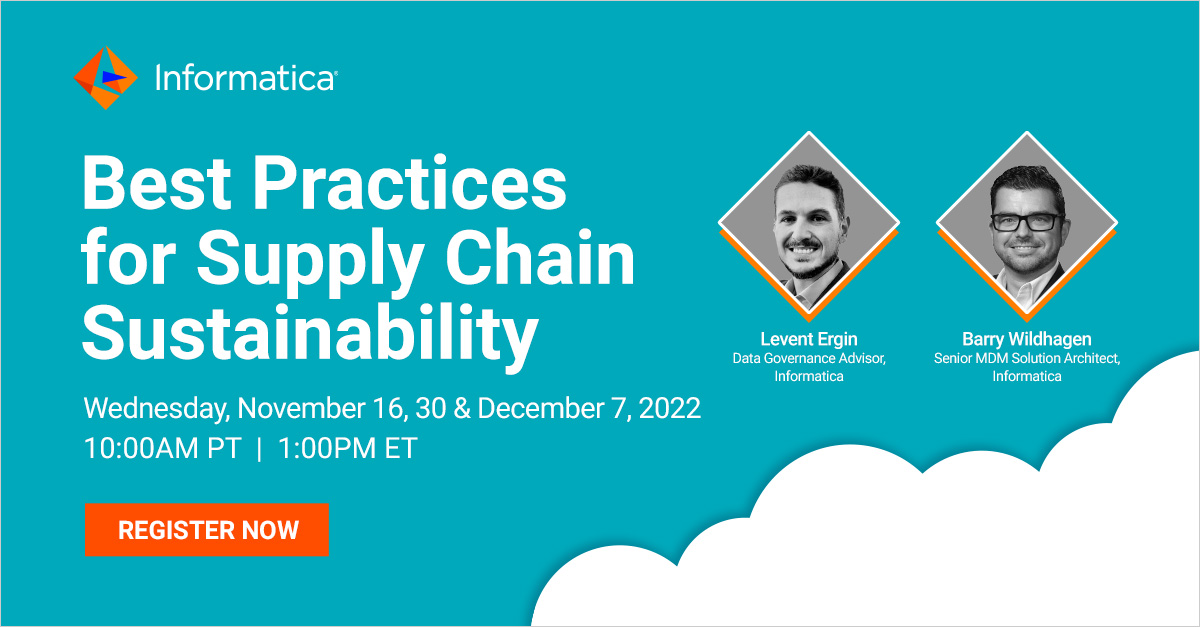Managing ESG Performance and Supplier Data Along the Supply Chain

At this point in the 21st century, we’ve already seen political and governmental unrest, significant climate change and a global pandemic. To say that the road forward is unclear is an understatement, but one thing is clear: consumers, employees and investors need a better way to measure how an organization impacts our world.
Environmental, social and governance (ESG) standards were initially developed as a way to help investors identify how well a company could perform over the long term. Now organizations like the World Economic Forum are using these standards so everyone can measure an organization’s environmental footprint, understand how their activities affect people and evaluate how responsibly the company is run. Examples of ESG data include carbon emissions, animal welfare, energy efficiency and working conditions, as well as human rights, health and safety.
Sustainability impacts an organization’s entire supply chain and product lifecycles. It’s therefore part of corporate agendas for leading companies everywhere. Sustainable and ethical sourcing, for example, ensures fair working conditions and standards in factories or farms (verifying that safety guidelines are followed, human rights are respected, no child labor is involved, and more). There are also many opportunities to create more sustainable supply chains when it comes to product packaging and tracking emissions with related shipping logistics. And finally, ESG is important in terms of recycling, such as how a company handles damaged or returned products.
And although ESG standards are seen as non-financial factors related to sustainability and social responsibility, they are also being used more frequently to analyze and identify a business’s risks and opportunities.
To achieve their ESG goals, executives are under intense pressure to address challenges such as climate change and racial inequity. Data, metrics and goals for products and suppliers play a huge role in this context. And this is an area of focus not just for chief sustainability officers1 and supply chain officers. Marketing, sourcing, product management and finance executives and their teams also measure and report on ESG challenges and risk.
Studies show that customers, investors, business leaders and employees care about ESG:
- 79% of investors say the way a company manages ESG risks and opportunities is an important factor in their investment decision making2
- 91% of business leaders believe their company has a responsibility to act on ESG issues3
- 86% of employees prefer to support or work for companies that care about the same issues they do4
Shortfalls identified in ESG governance, performance or culture represent risk to the business. They can lead to lost revenue, exposure to litigation or regulatory fines, damage to reputation and loss of a company’s social license to operate.
Emerging Global ESG Regulations Impacting the Supply Chain
ESG is on the corporate agenda across industries and sectors. It impacts business priorities and supply chain challenges throughout retail, consumer packaged goods (CPG), fashion, oil and gas and industrial manufacturing (like automotive). Who doesn’t recall the scandals around air-polluting diesel cars that claimed to be “clean”?
Every sector has their ESG challenges and requirements. This is also why most official ESG regulations apply to any industry.
Global ESG-related disclosure regulations are emerging. Some of them are still voluntary. Consider the US Securities and Exchange Commission (SEC) – TCFD – Scope 3 – Carbon Emissions in the Supply Chain in the US.5 This proposed regulation would require public companies to provide detailed reporting on their climate-related risks, emissions and net-zero transition plans.
In the European Union, the Non-Financial-Reporting-Directive (NFRD)6 has two main purposes:
- Provide non-financial information to stakeholders and investors to determine the companies' value creation and risks
- Encourage society to take responsibility for social and environmental concerns
The German Supply Chain Act7 will initially be in force as of 2023 for German companies with a workforce of at least 3,000. Later, it will be enforced at companies with workforces of 1,000 or more. This legislation aims to ensure better human rights protection. Companies must ensure compliance with human rights among their entire supply chain and must set up grievance mechanisms and report on their activities.
Leading Organizations Drive ESG Efforts Far Beyond Regulations
Whether voluntary or mandatory, consumers and employees want businesses to not just comply with regulations. Eighty-three percdent of consumers8 think companies should play an active role in shaping ESG best practices and want business to invest in making sustainable improvements to the environment and society. They’re prepared to reward (or penalize) brands accordingly.9
Leading brands and retailers understand the importance of ESG and have been investing in more sustainable supply chains and ESG performance management for many years. Unilever, a global leader in consumer packaged goods (CPG), has been a top performer among global CPG firms for years when it comes to sustainability.
For example, they make their suppliers accountable to support supply chain sustainability.10 Unilever asks their suppliers to declare the carbon footprint of their goods and services to ensure they meet their company standards. To help suppliers, Unilever is building emissions reporting requirements into its invoicing system. This includes a data standardization effort and a requirement that suppliers report emissions before the invoices will be paid. Standardization is key to comparing suppliers’ impact and tracking progress.
How ESG Reporting Creates Opportunities and Challenges
Organizations today face multiple challenges related to ESG performance and reporting. These challenges require them to take a data-driven and tech-enabled risk management approach.
- The need to manage multiple ESG reporting frameworks and evolving regulations, including competing standards
- A lack of visibility into ESG-related data across the organization and complex ESG data management, due to information being spread across data silos, making it difficult to get an integrated picture of ESG gains and impacts
- Low-quality ESG data as a result of non-existent data governance standards, missing or inconsistent quality checks and manual workflows
- Inability to get a full and trusted view of the supplier network and transparent supply chain data across the business to ensure all suppliers and sub-suppliers align with ESG standards and to make them accountable
To drive strategic and sustainable growth, organizations need to take a holistic approach to ESG and sustainability efforts. It is key to identify the various supply chain and product data needs and streamline efforts to cleanse, collect and manage this data and store it on a single platform for integrated analysis.
To learn more, join our webinar series ""How to" Supply Chain & ESG" and check out this white paper, “Meeting ESG Reporting Mandates by Enhancing Data Management.”
1 Empowered Chief Sustainability Officers, PWC: https://www.strategyand.pwc.com/de/en/unique-solutions/sustainable-impact-made-real/empowered-chief-sustainability-officers.html
2 PwC, “Companies failing to act on ESG issues risk losing investors, finds new PwC survey”: https://www.pwc.com/gx/en/news-room/press-releases/2021/pwc-esg-investor-survey-2021.html
3,4,8,9PwC, “Beyond compliance: Consumers and employees want business to do more on ESG”: https://www.pwc.com/us/en/services/consulting/library/consumer-intelligence-series/consumer-and-employee-esg-expectations.html
5 Understanding the SEC’s proposed climate risk disclosure rule, McKinsey & Company, June 3, 2022, Laura Corb, Kimberly Henderson, Tim Koller, and Shally Venugopal: https://www.mckinsey.com/business-functions/strategy-and-corporate-finance/our-insights/understanding-the-secs-proposed-climate-risk-disclosure-rule
6 Non-Financial Reporting Directive: https://finance.ec.europa.eu/capital-markets-union-and-financial-markets/company-reporting-and-auditing/company-reporting/corporate-sustainability-reporting_en
7 Supply Chain Act: https://www.bundesregierung.de/breg-en/federal-government/supply-chain-act-1872076
10 Unilever to request suppliers’ emissions data on invoices, Emma Cosgrove, June 17, 2020, Supply Chain Dive: https://www.supplychaindive.com/news/unilever-suppliers-emissions-data-sustainability/579988/

Aug 10, 2023
Aug 10, 2023

Aug 06, 2023
Aug 06, 2023

May 17, 2023
May 17, 2023







